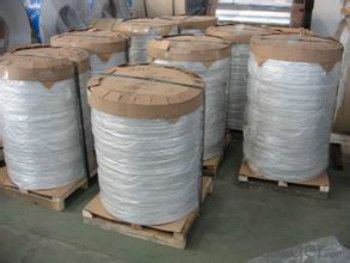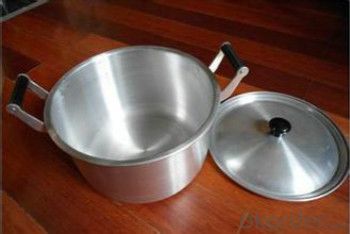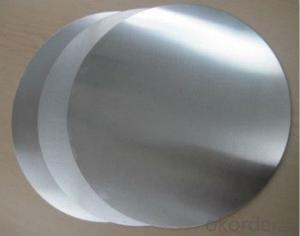CC Circle for Aluminium Cookeare Application
- Loading Port:
- Shanghai
- Payment Terms:
- TT OR LC
- Min Order Qty:
- 5 m.t.
- Supply Capability:
- 2000 m.t./month
OKorder Service Pledge
OKorder Financial Service
You Might Also Like
1. Structure of CC Aluminium in Coil Form for making Aluminium Circle Description
CC Aluminium in Coil Form for making Aluminium Circle is one semi-finished aluminium material. This coil can be rolled down to aluminium coil,sheet,circle ect. The alloy AA1050 is widly used in building, industry ect. Its weight is much lower than steel. So many customers choosed aluminium material instead of steel. Aluminium circle is widely used for kitchen wares including fried pans, non-sticky pans, cooking pots, hard anodize cook ware, pressure cooker and house hold utensils etc.
2. Specification of CC Aluminium in Coil Form for making Aluminium Circle
Aluminum Coil/Sheet | |
Main Specification | |
Alloy | AA1xxx (AA1050, AA1060, AA1070, AA1100 etc.) |
AA3xxx (AA3003, AA3004, AA3005, AA3105 etc.) | |
AA5xxx, AA6XXX (AA5052,AA5083, AA5754, AA6061, AA6062 etc.) | |
AA8xxx(AA8011, AA8006 etc.) | |
Temper | H14,H16, H18, H22, H24, H26, H32,O/F, T4, T6, T651 |
Thickmess | 0.01mm-100mm |
Width | 30mm-1700mm |
Standard | GB/T 3880-2006/ASTM |
Special specification is available on customer's requirement | |
3. Feature of CC Aluminium in Coil Form for making Aluminium Circle
Surfact Quality :
Be free from Oil Stain, Dent, Inclusion, Scratches, Stain, Oxide Dicoloration, Breaks, Corrosion, Roll Marks, Dirt Streaks and other defect which will interfere with use,
Mechenical Property:
Chemical Composite and Mechanical Property
4. Image of Aluminium Circle


5. FAQ
1) What is the delivery time?
Depends on actual order, around 20 to 35 days
2) What is the QC system:
We have QC staff of 20 persons and advanced equipment, each production is with MTC traced from Aluminum ingot lot.
3) What market do you mainly sell to?
Australia, America, Asia, Middle East, Western Europe, Africa etc
4) Payment term?
30% T/T in advance, balance against B/L copy.
- Q:i am thnking of building my own aluminum john boat and using the propulsion from a jetski to power it, i was wondering if anyone had taken on a project like this and had a few pieces of advice to offer while i am still in the planning stages. the biggest concern i have right now involves the tunnel for the intake, should i use the original fiberglass from the jetski or build up a tunnel out of aluminum for it?
- 518 okorder /
- Q:WHERE IS ALUMINIUM FOUND, LIKE WHERE IS IT MINED FROM...10 points tell me quick
- Australia, Brazil, China, India
- Q:The specification of thermal insulating aluminum coil
- 4-0 In general, the chemical engineering products for thermal insulation is 0. According to the International standard, the thickness tolerance is +-5%.02MM. according to industrial standard, it is +-0. The production crafts are embossed and plain sheet.
- Q:How are aluminum coils protected against oxidation?
- Aluminum coil coating is a process that safeguards aluminum coils from oxidation. It entails the application of a protective coating or layer onto the coil's surface to prevent direct contact with oxygen and other environmental factors that may induce oxidation. Acting as a barrier, this protective coating shields the aluminum from moisture, air, and other corrosive substances. Multiple types of coatings are utilized to protect aluminum coils. One common method involves applying a clear or colored organic coating, such as polyester or polyvinylidene fluoride (PVDF). These coatings not only create a barrier against oxidation but also enhance the coils' durability and aesthetic appeal. Another approach is anodizing, which immerses the aluminum coil in an electrolytic solution and passes an electric current through it. This process forms a layer of aluminum oxide on the coil's surface, serving as a natural protective barrier against oxidation. Anodized aluminum coils are renowned for their exceptional corrosion resistance and can be further improved with additional coating layers. Furthermore, chemical conversion coatings can be employed to protect aluminum coils. These coatings, such as chromate or phosphoric acid-based coatings, chemically react with the aluminum surface, generating a protective layer that prevents oxidation. In summary, safeguarding aluminum coils against oxidation is crucial for their longevity and performance. Through the application of various coatings, anodizing, or chemical conversion processes, the coils can effectively resist oxidation and maintain their integrity even in harsh environments.
- Q:What are the typical applications of aluminum coils in the automotive industry?
- Due to their advantageous properties, aluminum coils are widely utilized in various applications within the automotive industry. One particular use is in the manufacturing of heat exchangers, like radiators and condensers, which greatly benefit from aluminum's high thermal conductivity. This allows for efficient heat transfer, which in turn enhances the cooling efficiency of both the vehicle's engine and air conditioning system. Another common application of aluminum coils in the automotive sector involves constructing lightweight body panels and structural components. Aluminum's low density is well-known for reducing the overall weight of vehicles, resulting in improved fuel efficiency and reduced emissions. Additionally, the high strength-to-weight ratio of aluminum makes it an ideal material for impact-absorbing structures, thus enhancing vehicle safety. Aluminum coils are also extensively used in the production of electrical wiring systems and connectors in automobiles. Its excellent electrical conductivity enables efficient transmission of electrical signals throughout the vehicle. Furthermore, aluminum's corrosion resistance properties make it suitable for use in various weather conditions. Furthermore, aluminum coils are also employed in the production of suspension systems, including control arms and knuckles. The stiffness and durability of aluminum contribute to enhanced handling and responsiveness, ultimately resulting in improved driving dynamics. In conclusion, aluminum coils find typical applications in the automotive industry, including heat exchangers, lightweight body panels, electrical wiring systems, and suspension components. These applications effectively utilize the advantageous properties of aluminum, such as high thermal conductivity, low density, excellent electrical conductivity, and corrosion resistance.
- Q:Will the surface of the aluminum sheet touch the water?Aluminum rolls weighing 3.463 tons,.35mm thick, 900mm wide, very tight coil, is a mechanical binding. Water does not penetrate the surface of aluminium rolls
- It depends on how tight, very tight, aluminum will be together, that will certainly not water
- Q:Why does it take less energy to get aluminum metal from used cans than to get it directly from the ore?
- in order to extract the raw aluminum, you have to heat everything and melt it first, then remove the stuff that precipitates out as it cools or forms via chemical reaction with catalysts you introduce. With aluminum cans, you don't have to raise the temperature much above the melting point of aluminum, since it's already the substance in the can with the highest melting point. With aluminum ore, there can be anything in the ore with pretty much any melting point. In particular, if the ore contains an alloy of aluminum and a metal with a higher melting point than aluminum, then rest assured, you will have to raise the temperature of the ore above the melting point of aluminum in order to melt that alloy, In any case, because the maximum required temperature of the smelter needed to melt used aluminum cans is necessarily lower than the maximum temperature required to work with the ore, less energy is required to get aluminum from used cans than from ore.
- Q:What is the weight of aluminum coils per square foot?
- The weight of aluminum coils per square foot can vary depending on the thickness and grade of the aluminum, but on average, aluminum coils typically weigh between 0.5 to 1.5 pounds per square foot.
- Q:Are aluminum coils suitable for automotive body panels?
- Yes, aluminum coils are suitable for automotive body panels. Aluminum is lightweight, which helps improve fuel efficiency and overall vehicle performance. Additionally, aluminum is highly corrosion-resistant, making it an ideal choice for automotive applications where the panels are exposed to various weather conditions. Its high strength-to-weight ratio also provides excellent durability and crash resistance. Moreover, aluminum can be easily formed and shaped, allowing for intricate and stylish designs. Overall, the use of aluminum coils for automotive body panels offers numerous advantages and is a popular choice among car manufacturers.
- Q:Can aluminum coils be used for heat recovery systems?
- Indeed, heat recovery systems can utilize aluminum coils. Due to its exceptional heat conductivity, aluminum stands as an optimal option for heat transfer. In heat exchangers and heat recovery systems, aluminum coils frequently play a pivotal role in effectively transferring heat between different mediums. These coils are specifically engineered to maximize surface area, thereby enabling enhanced heat transfer. Furthermore, the lightweight and corrosion-resistant nature of aluminum renders it both durable and well-suited for a diverse range of applications within heat recovery systems.
1. Manufacturer Overview |
|
|---|---|
| Location | |
| Year Established | |
| Annual Output Value | |
| Main Markets | |
| Company Certifications | |
2. Manufacturer Certificates |
|
|---|---|
| a) Certification Name | |
| Range | |
| Reference | |
| Validity Period | |
3. Manufacturer Capability |
|
|---|---|
| a)Trade Capacity | |
| Nearest Port | |
| Export Percentage | |
| No.of Employees in Trade Department | |
| Language Spoken: | |
| b)Factory Information | |
| Factory Size: | |
| No. of Production Lines | |
| Contract Manufacturing | |
| Product Price Range | |
Send your message to us
CC Circle for Aluminium Cookeare Application
- Loading Port:
- Shanghai
- Payment Terms:
- TT OR LC
- Min Order Qty:
- 5 m.t.
- Supply Capability:
- 2000 m.t./month
OKorder Service Pledge
OKorder Financial Service
Similar products
New products
Hot products
Related keywords




























